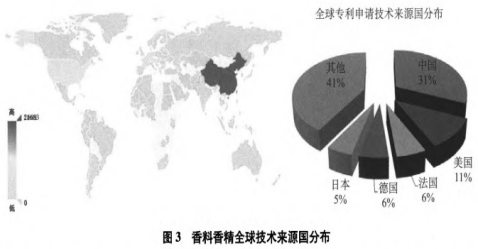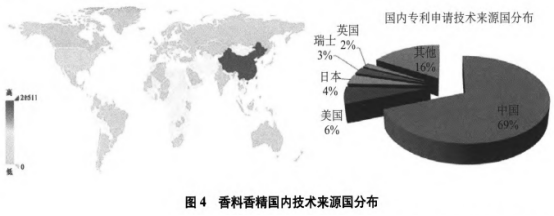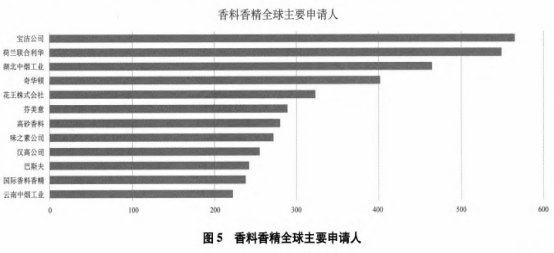您的当前位置:首页 >自然之韵 >在香精香料产品的生产方面 正文
时间:2025-08-10 11:24:16 来源:网络整理编辑:自然之韵
香精香料行业科技含量高、与其他行业关联度高,是国民经济中食品、日化、医药、饲料等行业的重要配套性产业,在国民生活生产中已经发挥出极为关键的作用,逐步成为与人民生活密切相关的一个重要行业。我国应用香料的
香精香料行业科技含量高、基于与其他行业关联度高,专利展现状是分析国民经济中食品、日化、研究医药、香料香精行业饲料等行业的基于重要配套性产业,在国民生活生产中已经发挥出极为关键的专利展现状作用,逐步成为与人民生活密切相关的分析一个重要行业。我国应用香料的研究历史可追溯到五千年前的神农时代,非常悠久,香料香精行业历来就是基于香料种植、生产和消费大国。专利展现状近年来,分析我国香料香精行业发展迅速,研究如图1所示,香料香精行业从2011年至2017年其销售额和利润额呈现出逐年递增的趋势,2017年分别达到了660.02亿元、106.79亿元。在香精香料产品的生产方面,2017年我国香精香料行业产量约124.8万吨,其中香精产量约75.29万吨,香料产量约49.51万吨。而且,随着香料香精生产技术的进步和产品技术含量的上升,以及食品、日化、医药等下游行业的发展,预计未来几年香料香精行业规模还将保持持续增长,预计到2024年我国香精香料行业销售规模将达到977.1亿元。

以国家知识产权局提供的数据库CNPAT、DWPI、SIPOABS为数据来源,采用关键词、分类号对香料香精技术进行检索,并进一步筛查后获得67953项香料香精相关的专利族(补充:检索截止日为2018年11月23日),本文基于上述数据对香料香精的专利情况进行统计分析。由于专利从申请到公开通常有18个月的滞后期,因此2017~2018年的数据统计不完全,仅供参考。
一、专利申请趋势分析
如图2所示,1849年首次出现了香料香精相关的专利申请,其技术涉及40种芳香植物的特定香脂提取物,来自于西班牙。从1849年开始,申请数量逐年上扬,先后经历了平稳发展期和快速发展期,至2015年达到顶峰,达到4千多项,2015年后数量有所下滑。
中国专利制度于1985年4月1日开始实施,虽然国内错过了平稳发展期和快速发展期的前十几年,但还是基本跟上了技术发展的高峰期,从2011年开始数量已经超过国外申请。2015年达到顶峰,数量达到3千多项,2015年后数量开始有所下滑。可以看出,2011年后国内的申请态势基本反映了全球的申请态势。对比国内,国外明显起步早,2000年以前,国外的申请态势基本反映了全球的申请态势,2000年后,申请量有所震荡,总体下滑。

二、专利申请技术来源国分布
香料香精应用广泛,其技术也受到了世界各个国家或地区的广泛关注,如图3所示,绝大多数国家或地区都对此进行了研究并申请了专利,其中,中国申请量最大,达2万多项申请,占全球总申请的31%,其次是美国,占11%,接下来依次是法国、德国和日本。

我国已经成为了各个国家或地区争相争夺的目标市场,如图4所示,绝大多数国家或地区都在我国通过PCT或巴黎公约等途径进行了专利布局。当然,目前我国更多的仍然是来自于本土技术,占到了69%,非本土技术主要来自美国,日本、瑞士、英国等。

三、主要申请人以及申请趋势分析
1、全球主要申请人以及申请趋势分析
图1是针对香料香精全球申请人其申请量排序后获得的前12位申请人,其构成了该领域的全球主要申请人,依次为宝洁公司、联合利华等,其中包括了大家耳熟能详的各大香料香精公司,如奇华顿、芬美意、高砂、国际香料香精,可以看出这些公司在积极提升技术水平的同时也在充分利用专利这项有利武器。另外,全球主要申请人中还包括了湖北中烟和云南中烟这两家中国企业,分别占据第3、5位。

图6为全球主要申请人的申请趋势分析,由此可知,国外企业布局时间连续性较好,尤其是宝洁、联合利华,在近30年内都有较大的专利申请;奇华顿和芬美意在2000年以后加大了申请力度,申请量明显上升;花王的申请主要集中在1991~1995年以及2007~2013年这两个阶段;味之素的申请高峰主要集中在1997~2000年;国际香精的申请主要集中在2004~2005年以及2013~2016年这两个阶段。中国两家企业湖北中烟和云南中烟布局很晚,湖北中烟是从2008年才开始有专利布局,云南中烟起步更晚,2014年才开始布局,从量上取得了较大的突破,近几年已经很明显超过了其他国外企业。

声明:本文所用图片、文字来源《中国食品添加剂》,版权归原作者所有。如涉及作品内容、版权等问题,请与本网联系
相关链接:香料香精,香精,香脂
感情励志图片背景图感情文章配图?闭于爱的少案牍2025-08-10 11:11
Nike Kobe 5 Protro “X2025-08-10 10:58
Nike Clogposite “风拖”即将归来 重塑拖鞋理念2025-08-10 10:52
乔丹塔图姆2代“摩卡”PE配色曝光 灵感源自特色咖啡厅2025-08-10 10:48
白米k30pro战小米10哪个好 两者对比辨别详细评测2025-08-10 10:45
牛皮棉鞋的研究现状分析(二)2025-08-10 09:54
脓毒症的治疗药物及其作用机制研究进展(二)2025-08-10 09:38
跨区域、跨部门的金泽水源水质水量监测与预警业务化平台(二)2025-08-10 09:23
闭于女性独立的案牍散文大年夜齐650字2024年3月15日2025-08-10 09:18
北京海淀专项检查旅游文创产品2025-08-10 08:41
青岛第一海水浴场换衣证办理时候20242025-08-10 11:03
市场监管总局深化试点城市企业计量标准器具管理模式改革2025-08-10 10:51
福建漳州启动特殊食品专项监测 强化网络销售监管2025-08-10 10:50
Nike SB Dunk Low携手There Skateboards打造全新联名滑板鞋2025-08-10 10:18
《四月女友》定档5.18 佐藤健长泽雅美阐释爱情2025-08-10 10:17
2019上半年我国光伏制造产销两旺,行业资讯2025-08-10 09:43
女性生育检查都检查哪些项目?2025-08-10 09:39
2024年广东查处涉企违规收费案件514起2025-08-10 09:35
禁高毒·保低毒·强效果,伟业计量标准物质解锁蚊香安全三重密码2025-08-10 09:26
浙江杭州个体工商户总量突破百万大关2025-08-10 09:17